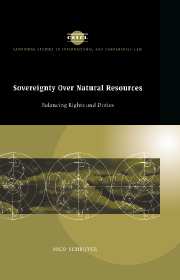Book contents
- Frontmatter
- Contents
- List of boxes, figures and tables
- Preface
- Acknowledgments
- List of abbreviations
- List of main symbols used in UN documents
- Glossary
- Table of cases
- 1 Introduction
- PART I The birth and development of the principle: the UN General Assembly as midwife
- Introductory remarks to Part I
- 2 The formative years (1945–1962)
- 3 Promoting economic development by the exercise of permanent sovereignty: the period after 1962
- 4 Permanent sovereignty, environmental protection and sustainable development
- 5 Permanent sovereignty over natural resources in territories under occupation or foreign administration
- PART II Natural-resource law in practice: from creeping national jurisdiction towards international co-operation
- PART III Balancing rights and duties in an increasingly interdependent world
- Appendices
- Bibliography
- Index
- Books in the series
4 - Permanent sovereignty, environmental protection and sustainable development
Published online by Cambridge University Press: 23 October 2009
- Frontmatter
- Contents
- List of boxes, figures and tables
- Preface
- Acknowledgments
- List of abbreviations
- List of main symbols used in UN documents
- Glossary
- Table of cases
- 1 Introduction
- PART I The birth and development of the principle: the UN General Assembly as midwife
- Introductory remarks to Part I
- 2 The formative years (1945–1962)
- 3 Promoting economic development by the exercise of permanent sovereignty: the period after 1962
- 4 Permanent sovereignty, environmental protection and sustainable development
- 5 Permanent sovereignty over natural resources in territories under occupation or foreign administration
- PART II Natural-resource law in practice: from creeping national jurisdiction towards international co-operation
- PART III Balancing rights and duties in an increasingly interdependent world
- Appendices
- Bibliography
- Index
- Books in the series
Summary
Growing international awareness of environmental degradation
Under the auspices of the World Meteorological Organization (WMO), an International Geophysical Year was proclaimed in 1957–8, mainly focusing on meteorological and ozone-layer observations, including atmospheric pollution and climate change. The Year marked the beginning of a broader interest in the state of the world environment. During the 1960s the global extent of resource depletion and environmental degradation came to the fore. A wide variety of environmentally relevant issues came under discussion including: the long-term damaging effects on nature of products containing DDT; excessive economic growth; tanker disasters on the high seas or in territorial waters; contamination of water; harmful chemicals; waste discharge; the testing of nuclear weapons; population growth; wasteful consumption patterns; and unrestricted use of the world's natural resources. Such issues provoked a new debate on traditional international law, including the principles of freedom of action and non-interference in domestic affairs. Previously, if issues of sea and river pollution were addressed at all at the international level, it was not so much because of fear of damage to the human environment and the ecological balance at large, but because of the threat posed to economic interests, for example, to fish stocks and consequently to the fishing industry.
During the 1960s this situation radically changed. It was realized that the ‘human environment’ as such was at stake. People began to see the world as an entity, as ‘spaceship earth’. This affected thinking on State sovereignty.
- Type
- Chapter
- Information
- Sovereignty over Natural ResourcesBalancing Rights and Duties, pp. 120 - 142Publisher: Cambridge University PressPrint publication year: 1997



